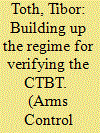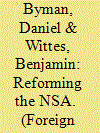| Srl | Item |
| 1 |
ID:
091398


|
|
|
|
|
| Publication |
2009.
|
| Summary/Abstract |
Over the last decade, considerable progress has been made in building up the unique verification regime of the Comprehensive Nuclear-Test-Ban Treaty (CTBT) to monitor the globe for nuclear explosions.
The CTBT's global alarm system has grown not only quantitatively through the increase in number of monitoring facilities, but also qualitatively. As a result of scientific and technological progress in monitoring technologies, including in the automatic processing of data, the system, although still incomplete, is already more powerful than expected by the treaty's negotiators. Therefore, there is a very high probability today that a militarily significant nuclear test anywhere on the planet will be detected by the system. This capability will further increase as more and more monitoring stations join the global network of the Preparatory Commission for the Comprehensive Nuclear-Test-Ban Treaty Organization (CTBTO), the organization mandated to establish the verification regime so that it is operational when the treaty enters into force.
|
|
|
|
|
|
|
|
|
|
|
|
|
|
|
|
| 2 |
ID:
130474


|
|
|
|
|
| Publication |
2014.
|
| Summary/Abstract |
The long-running debate over the tradeoffs the United States should make between national security and civil liberties flared up spectacularly last summer, when Edward Snowden, a National Security Agency contractor, handed journalists a huge trove of heavily classified documents that exposed, in excruciating detail, electronic surveillance programs and other operations carried out by the NSA. Americans suddenly learned that in recent years, the NSA had been acquiring the phone and Internet communications of hundreds of thousands of U.S. citizens, as well as collecting massive volumes of bulk telephone records known as "metadata" -- phone numbers and the time and length of calls. Along with the rest of the world, Americans found out that the NSA had broken common forms of online encryption, tapped the phones of various foreign heads of state, and monitored global communications far more aggressively than was previously understood.
|
|
|
|
|
|
|
|
|
|
|
|
|
|
|
|